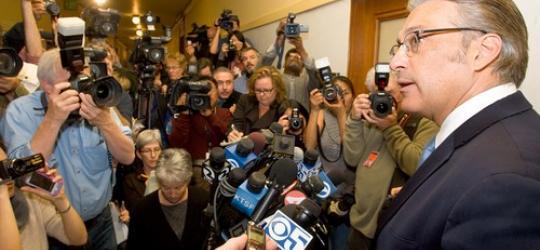The Ethics Commission – in a decision made by Chair Benedict Hur, to whom the commission had given the authority to make procedural decisions – today rejected a request by attorneys for suspended Sheriff Ross Mirkarimi to delay transfer of his official misconduct case to the Board of Supervisors until after the Nov. 6 election.
Mirkarimi’s attorneys argued that the decision has been overly politicized during the election season, with supervisorial challengers turning the decision into a litmus test and interest groups polling voters on whether they would be more likely to reject supervisors who voted for reinstating Mirkarimi. The City Charter requires the board to act within 30 days of receiving the official record from Ethics, which will probably happen early next week.
“The fate of the sheriff has been made a key political issue in the election by the media, candidates, consultants, mayoral appointees to commissions, and others. Sending the record to the Board immediately prior to an election deprives the Sheriff of a neutral decision-maker, as guaranteed by the Due Process clauses of the 5th and 14th Amendments,” attorney David Waggoner wrote to the commission on Sept. 10, attaching eight articles and campaign pieces linking the Mirkarimi decision to the supervisorial races.
But Hur disagreed. “There is no evidence suggesting that any member of the Board of Supervisors will disregard the facts and the law and instead vote to sustain the charges based upon perceived political pressure,” he wrote. Actually, he argued that “granting the Sheriff’s request would cause the Commission to engage in the type of political maneuvering that it seeks to avoid. The commission will not manipulate the timing of the Board’s decision in a misguided attempt to predict the nadir of public pressure on the Supervisors.”
Mirkarimi told the Guardian that he was disappointed by the decision, noting that it was Mayor Ed Lee’s piling on of excessive charges that the commission found no evidence to support that have delayed the board’s deliberations until the height of the election season. “This is so vividly and transparently political.”

